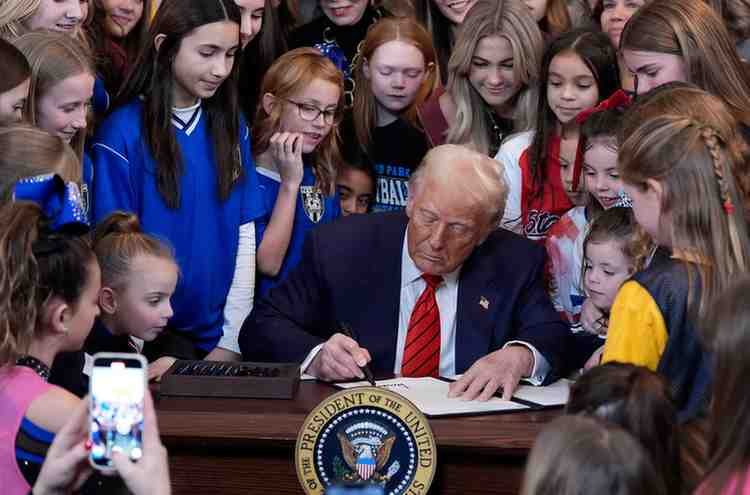In a significant move that has sparked widespread debate, President Donald Trump signed an executive order on Wednesday aimed at prohibiting transgender athletes from participating in girls’ and women’s sports. This directive aligns with the administration’s interpretation of Title IX, which prohibits sex-based discrimination in educational programs and activities receiving federal funding.
The executive order, titled “Keeping Men Out of Women’s Sports,” grants federal agencies extensive authority to enforce this interpretation of Title IX, defining “sex” as the gender assigned at birth. During the signing ceremony held in the East Room of the White House, Trump declared, “With this executive order, the war on women’s sports is over.” He was flanked by lawmakers and female athletes, including former collegiate swimmer Riley Gaines, who have publicly supported the ban.
White House Press Secretary Karoline Leavitt emphasized that the order “honors the promise of Title IX” and will lead to “immediate enforcement actions” against schools and athletic organizations that do not comply with the new guidelines. The timing of the order coincided with National Girls and Women in Sports Day, further highlighting the administration’s focus on this issue.
This executive action is part of a broader trend of initiatives by the Trump administration aimed at curtailing transgender rights. During his campaign, Trump discovered that the topic resonated with a significant portion of the electorate, with more than half of respondents in an AP VoteCast survey expressing the belief that support for transgender rights had gone too far. He capitalized on this sentiment, pledging to end what he termed “transgender insanity,” although his campaign provided limited specifics on how he would achieve this.
The order provides clearer guidelines for enforcement, empowering the Department of Education to penalize schools that allow transgender athletes to compete in women’s sports. Schools found to be in violation of this directive could face the loss of federal funding, a significant consequence for many educational institutions that rely on such support.
Enforcement of the executive order is expected to be a top priority for the Department of Education, which has faced scrutiny and challenges in recent months. In a recent call, the acting director of the Office for Civil Rights instructed staff to align their investigations with the priorities set forth by the Trump administration, according to sources who spoke to the Associated Press on the condition of anonymity due to concerns about potential retaliation.
In addition to the domestic implications of the order, Trump also directed attention to the international stage, particularly regarding the upcoming 2028 Summer Olympics in Los Angeles. He issued a stern warning to the International Olympic Committee (IOC), stating that he had tasked Secretary of State Marco Rubio with communicating that “America categorically rejects transgender lunacy.” Trump urged the IOC to revise its policies concerning transgender athletes, labeling the current situation as “absolutely ridiculous.”
The executive order has ignited a firestorm of reactions from various stakeholders, including athletes, advocacy groups, and political opponents. Supporters of the ban argue that it is necessary to protect the integrity of women’s sports and ensure fair competition. Conversely, critics contend that the order discriminates against transgender individuals and undermines their rights to participate in sports.
As the debate continues, the implications of this executive order will likely reverberate through schools, athletic organizations, and the broader societal discourse on gender identity and rights. The administration’s commitment to enforcing this directive will be closely monitored, as it could set a precedent for future policies regarding transgender participation in sports and other areas of public life.
In the coming weeks and months, the response from educational institutions, athletic organizations, and advocacy groups will shape the landscape of women’s sports and the rights of transgender athletes in the United States. The executive order marks a pivotal moment in the ongoing conversation about gender, sports, and equality, with potential ramifications that extend far beyond the realm of athletics.








